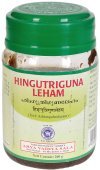Rasna, Rāsnā, Rashna, Rasona, Rasa-una: 17 definitions
Introduction:
Rasna means something in Hinduism, Sanskrit, Marathi, Hindi, biology. If you want to know the exact meaning, history, etymology or English translation of this term then check out the descriptions on this page. Add your comment or reference to a book if you want to contribute to this summary article.
In Hinduism
Ayurveda (science of life)
Rasashastra (Alchemy and Herbo-Mineral preparations)
Source: Wisdom Library: Rasa-śāstraRāsnā (रास्ना):—One of the sixty-seven Mahauṣadhi, as per Rasaśāstra texts (rasa literature). These drugs are useful for processing mercury (rasa), such as the alchemical processes known as sūta-bandhana and māraṇa.
Cikitsa (natural therapy and treatment for medical conditions)
Source: Wisdom Library: Ayurveda: CikitsaRāsnā (रास्ना) is a Sanskrit word referring to Pluchea lanceolata, a species of plant from the Asteraceae (sunflower) family of flowering plants. It is used throughout Ayurvedic literature such as the Caraka-saṃhitā. The literal translation of Rāsnā is “a girdle”.
This plant (Rāsnā) is also mentioned as a medicine used for the treatment of all major fevers (jvara), as described in the Jvaracikitsā (or “the treatment of fever”) which forms the first chapter of the Sanskrit work called Mādhavacikitsā.
Nighantu (Synonyms and Characteristics of Drugs and technical terms)
Source: WorldCat: Rāj nighaṇṭuRāsnā (रास्ना) is another name for Śvetakaṇṭakārī, a medicinal plant related to Kaṇṭakārī, according to verse 4.33-36 of the 13th-century Raj Nighantu or Rājanighaṇṭu. The fourth chapter (śatāhvādi-varga) of this book enumerates eighty varieties of small plants (pṛthu-kṣupa). Together with the names Rāsnā and Śvetakaṇṭakārī, there are a total of twenty-four Sanskrit synonyms identified for this plant.
Kalpa (Formulas, Drug prescriptions and other Medicinal preparations)
Source: Shodhganga: Edition translation and critical study of yogasarasamgrahaRāsnā (रास्ना) refers to the medicinal plant known as “Alpinia galanga (Linn.) Willd.” and is dealt with in the 15th-century Yogasārasaṅgraha (Yogasara-saṅgraha) by Vāsudeva: an unpublished Keralite work representing an Ayurvedic compendium of medicinal recipes. The Yogasārasaṃgraha [mentioning rāsnā] deals with entire recipes in the route of administration, and thus deals with the knowledge of pharmacy (bhaiṣajya-kalpanā) which is a branch of pharmacology (dravyaguṇa).
Unclassified Ayurveda definitions
Source: PMC: Ayurvedic management of postlumbar myelomeningocele surgeryCaraka has identified Rāsnā (Pluchea lanceolata) as the prime drug for subduing vāta vitiation.
Source: eJournal of Indian Medicine: Jajjaṭa’s Nirantarapadavyākhyā and Other Commentaries on the CarakasaṃhitāRāsnā (रास्ना) refers to a medicinal plant mentioned in the 7th-century Nirantarapadavyākhyā by Jejjaṭa (or Jajjaṭa): one of the earliest extant and, therefore, one of the most important commentaries on the Carakasaṃhitā.—Synonyms of Rāsnā: Rosanā, Vāyasuraī, Atirasā (?)[sic], Elāparṇī, Muktā (Yuktā), Surabhi; Pluchea lanceolata Oliver and Hiern.—(Cf. Glossary of Vegetable Drugs in Bṛhattrayī 337-338, Singh and Chunekar, 1999).—Pluchea lanceolata (DC.) C.B.Clarke.—(Cf. The Plant List, A Working List of All Plant Species, Royal Botanic Gardens, Kew and Missouri Botanical Garden).

Āyurveda (आयुर्वेद, ayurveda) is a branch of Indian science dealing with medicine, herbalism, taxology, anatomy, surgery, alchemy and related topics. Traditional practice of Āyurveda in ancient India dates back to at least the first millenium BC. Literature is commonly written in Sanskrit using various poetic metres.
Biology (plants and animals)
Source: Wisdom Library: Local Names of Plants and DrugsRasna in the Bengali language is the name of a plant identified with Vanda tessellata (Roxb.) Hook. ex G.Don from the Orchidaceae (Orchid) family having the following synonyms: Epidendrum tessellatum, Vanda roxburghii, Cymbidium tessellatum. For the possible medicinal usage of rasna, you can check this page for potential sources and references, although be aware that any some or none of the side-effects may not be mentioned here, wether they be harmful or beneficial to health.
Rasna in the Sanskrit language is the name of a plant identified with Dodonaea viscosa Jacq. from the Sapindaceae (Soapberry) family.
Rasna in the Sanskrit language is the name of a plant identified with Acampe carinata (Griff.) Panigrahi from the Orchidaceae (Orchid) family having the following synonyms: Acampe papillosa var. flava, Gastrochilus carinatus.
Rasna [रसना] in the Marathi language is the name of a plant identified with Pluchea lanceolata (DC.) C.B.Clarke from the Asteraceae (Sunflower) family having the following synonyms: Berthelotia lanceolata.
Rashna in the Marathi language, ibid. previous identification.
Rasna [रसना] in the Sanskrit language, ibid. previous identification.
Rasna in the Telugu language, ibid. previous identification.
Rasna in the Sanskrit language is the name of a plant identified with Alpinia calcarata (Andrews) Roscoe from the Zingiberaceae (Ginger) family.
Rasna in the Hindi language is the name of a plant identified with Leucoblepharis subsessilis Arn. from the Asteraceae (Sunflower) family having the following synonyms: Blepharispermum subsessile.
Rasna in the Hindi language, ibid. previous identification.
Rasna in the Oriya language, ibid. previous identification.
Rasna in the Oriya language, ibid. previous identification.
Rasna [रास्ना] in the Sanskrit language is the name of a plant identified with Acampe praemorsa (Roxb.) Blatt. & McCann from the Orchidaceae (Orchid) family having the following synonyms: Acampe excavata, Acampe wightiana, Vanda wightiana.
Source: Google Books: CRC World Dictionary (Regional names)Rashna in India is the name of a plant defined with Pluchea lanceolata in various botanical sources. This page contains potential references in Ayurveda, modern medicine, and other folk traditions or local practices It has the synonym Berthelotia lanceolata DC. (among others).
Example references for further research on medicinal uses or toxicity (see latin names for full list):
· Annals of the Missouri Botanical Garden (1994)
· Fl. Egypt (2002)
· Flora Indica, or ‘Descriptions of Indian Plants’ (1995)
· Flora of Tropical Africa (1877)
· Prodromus Systematis Naturalis Regni Vegetabilis (1836)
· Pakistan Journal of Botany (1988)
If you are looking for specific details regarding Rashna, for example extract dosage, diet and recipes, chemical composition, side effects, health benefits, pregnancy safety, have a look at these references.

This sections includes definitions from the five kingdoms of living things: Animals, Plants, Fungi, Protists and Monera. It will include both the official binomial nomenclature (scientific names usually in Latin) as well as regional spellings and variants.
Languages of India and abroad
Marathi-English dictionary
Source: DDSA: The Molesworth Marathi and English Dictionaryrāṣṇā (राष्णा).—m (Properly rāsnā) A plant, Mimosa octandra: also its root as a drug.
--- OR ---
rāsnā (रास्ना).—m S A medicinal shrub, Mimosa octandra.
Marathi is an Indo-European language having over 70 million native speakers people in (predominantly) Maharashtra India. Marathi, like many other Indo-Aryan languages, evolved from early forms of Prakrit, which itself is a subset of Sanskrit, one of the most ancient languages of the world.
Sanskrit dictionary
Source: Cologne Digital Sanskrit Dictionaries: Shabda-Sagara Sanskrit-English DictionaryRāsnā (रास्ना).—f.
(-snā) 1. A plant, (Mimosa octandra.) 2. Another plant, (the serpent ophioxylon.) 3. A sort of perfume. E. ras to sound, nak Unadi aff., and the vowel made long.
Source: Cologne Digital Sanskrit Dictionaries: Benfey Sanskrit-English DictionaryRasna (रस्न).—n. A thing.
--- OR ---
Rāsnā (रास्ना).—f. A sort of perfume.
Source: Cologne Digital Sanskrit Dictionaries: Cappeller Sanskrit-English DictionaryRasona (रसोन).—[masculine] a kind of garlic.
--- OR ---
Rāsnā (रास्ना).—[feminine] girdle; poss. rāsnāva.
Source: Cologne Digital Sanskrit Dictionaries: Monier-Williams Sanskrit-English Dictionary1) Rasona (रसोन):—[from rasa > ras] a See rasona, p.871.
2) [from rasuna] b m. idem, [Suśruta; cf. Lexicographers, esp. such as amarasiṃha, halāyudha, hemacandra, etc.]
3) Rasna (रस्न):—n. (said to be [from] √1. ras) a thing, object, [Uṇādi-sūtra iii, 12 [Scholiast or Commentator]]
4) Rasnā (रस्ना):—[from rasna] f. = rasanā, the tongue, [cf. Lexicographers, esp. such as amarasiṃha, halāyudha, hemacandra, etc.]
5) Rāsnā (रास्ना):—f. a girdle (cf. raśanā, raśmi), [Vājasaneyi-saṃhitā; Śatapatha-brāhmaṇa]
6) the ichneumon plant, [Suśruta; Śārṅgadhara-saṃhitā] ([varia lectio] rāṣṇā)
7) Name of various other plants (Mimosa Octandra; Acampe Papillosa etc.), [cf. Lexicographers, esp. such as amarasiṃha, halāyudha, hemacandra, etc.]
8) bdellium, [Bhāvaprakāśa]
Source: Cologne Digital Sanskrit Dictionaries: Yates Sanskrit-English Dictionary1) Rasona (रसोन):—(naḥ) 1. m. Garlic.
2) Rasna (रस्न):—(snaṃ) 1. n. Thing, substance.
3) Rāsnā (रास्ना):—(snā) 1. f. Mimosa octandra.
[Sanskrit to German]
Sanskrit, also spelled संस्कृतम् (saṃskṛtam), is an ancient language of India commonly seen as the grandmother of the Indo-European language family (even English!). Closely allied with Prakrit and Pali, Sanskrit is more exhaustive in both grammar and terms and has the most extensive collection of literature in the world, greatly surpassing its sister-languages Greek and Latin.
Hindi dictionary
Source: DDSA: A practical Hindi-English dictionary1) Rasna in Hindi refers in English to:—(nf) the tongue; —[kholana] to speak out; —[talu se lagana] to become mute, to be quiet..—rasna (रसना) is alternatively transliterated as Rasanā.
2) Rasna in Hindi refers in English to:—(v) to get displeased/angry; to sulk..—rasna (रूसना) is alternatively transliterated as Rūsanā.
...
See also (Relevant definitions)
Starts with: Rasna jadi, Rasna krishna, Rasna nai, Rasna shveth, Rasnabheda, Rasnadi, Rasnah, Rasnairandadi, Rasnajadi, Rasnajandi, Rasnajhodi, Rasnaka, Rasnakavava, Rasnakavavavihara, Rasnamool, Rasnasaptakakvatha, Rasnava.
Ends with (+82): Adarshaprashna, Adhanaprashna, Aksharaprashna, Alankarika-prashna, Amalaprashna, Anamayaprashna, Anantasanaprashna, Angushthaprashna, Antaraprashna, Anuprashna, Apaprashna, Apastambaprashna, Aprashna, Arad krasna, Argalaprashna, Ashvamedhaprashna, Atiprashna, Ayaprashna, Badarayanaprashna, Bahuprashna.
Full-text (+62): Rasona, Dronagandhika, Atirasa, Dhurtamanusha, Nandagopita, Bhujamgakshi, Rasana, Sugandhimula, Shvetarasna, Rasuna, Mukta, Rasya, Rasnava, Sugandhamula, Elaparni, Rasonam, Rasna jadi, Rasna krishna, Rasna shveth, Chhota rasna.
Relevant text
Search found 16 books and stories containing Rasna, Rasa-una, Rasa-ūna, Rashna, Rāsnā, Rāṣṇā, Rasnā, Rasona; (plurals include: Rasnas, unas, ūnas, Rashnas, Rāsnās, Rāṣṇās, Rasnās, Rasonas). You can also click to the full overview containing English textual excerpts. Below are direct links for the most relevant articles:
Amarakoshodghatana of Kshirasvamin (study) (by A. Yamuna Devi)
Rasa Jala Nidhi, vol 3: Metals, Gems and other substances (by Bhudeb Mookerjee)
Part 24 - Usage of poisons < [Chapter XXX - Visha (poisons)]
Part 5 - Taking of tin < [Chapter VI - Metals (6): Vanga (tin)]
Part 14 - Dietary presecriptions and prohibitions when taking iron < [Chapter IV - Metals (4): Lauha (iron)]
The Agni Purana (by N. Gangadharan)
Chapter 285 - The accomplished recipes that would revive the dead (mṛtasañjīvanī)
Chapter 300 - Mantras which remove the baneful influences of planets
Chapter 289 - The treatment of the diseases of the horses (aśvacikitsā)
Rasa Jala Nidhi, vol 2: Minerals (uparasa) (by Bhudeb Mookerjee)
Part 6 - Removal of odour from sulphur < [Chapter VIII - Uparasa (9): Gandhaka (sulphur)]
Part 2 - Purification of shilajatu < [Chapter IV - Uparasa (4): Shilajatu or Shilajit (bitumen)]
Part 3 - Incineration of haritala < [Chapter XII - Uparasa (13): Haritala (orpiment)]
Rasa Jala Nidhi, vol 4: Iatrochemistry (by Bhudeb Mookerjee)
Part 2 - Treatment for enlargement of spleen and liver (1): Plihantaka rasa < [Chapter VII - Enlargement of spleen (plihodara) and liver (yakridudara)]
Part 50 - Treatment for chronic diarrhea (22): Sarvarogya rasa < [Chapter III - Jvaratisara fever with diarrhoea]
Bharadvaja-srauta-sutra (by C. G. Kashikar)
Related products
(+75 more products available)





